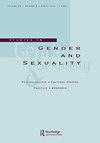Do Psychoanalysts Dream of Polymorphous Sleep?: Clinical Desiring With Transgender Subjects
Q3 Social Sciences
引用次数: 1
Abstract
ABSTRACT This article borrows from the lessons of dystopic science fiction to analyze fantasies that surround gender variance and perversion in the psychoanalytic clinic. Philip K. Dick’s novel Do Androids Dream of Electric Sheep? is used to substrate Lacan’s formations of perversion and their relationship to the paradoxical nature of desire. Lacan’s idiosyncratic handling of perversion formulates an essential truth about the problematic nature of human desiring, a problem that must be creatively mitigated. This article postulates that quotidian difficulties of desire manifest symptomatically in psychoanalytic and psychiatric work with transgender patients through clinical expressions of transphobia. These claims are illustrated with a close reading of a 1948 clinical case study with a transgender analysand. The case pays special attention to the patient’s pencil drawing, produced while in treatment, which visually represents their gender.心理咨询师会梦见多形睡眠吗?:对跨性别受试者的临床渴望
本文借鉴反乌托邦科幻小说的经验教训,分析精神分析诊所中围绕性别变异和变态的幻想。菲利普·k·迪克的小说《机器人会梦见电子羊吗?》用来奠定拉康的变态的形成,以及它们与欲望的矛盾本质的关系。拉康对变态的特殊处理,形成了一个关于人类欲望的问题本质的基本真理,一个必须被创造性地缓和的问题。本文假设日常的欲望困难通过跨性别恐惧症的临床表现在跨性别患者的精神分析和精神病学工作中表现出来。这些主张是通过仔细阅读1948年的一项跨性别分析的临床病例研究来说明的。该病例特别关注患者在治疗过程中绘制的铅笔画,这在视觉上代表了他们的性别。
本文章由计算机程序翻译,如有差异,请以英文原文为准。
求助全文
约1分钟内获得全文
求助全文
来源期刊

Studies in Gender and Sexuality
Social Sciences-Gender Studies
CiteScore
0.80
自引率
0.00%
发文量
15
期刊介绍:
Beginning in the final two decades of the 20th century, the study of gender and sexuality has been revived from a variety of directions: the traditions of feminist scholarship, postclassical and postmodern psychoanalytic theory, developmental research, and cultural studies have all contributed to renewed fascination with those powerfully formative aspects of subjectivity that fall within the rubric of "gender" and "sexuality." Clinicians, for their part, have returned to gender and sexuality with heightened sensitivity to the role of these constructs in the treatment situation, including the richly variegated ways in which assumptions about gender and sexuality enter into our understandings of "normality" and "pathology."
 求助内容:
求助内容: 应助结果提醒方式:
应助结果提醒方式:


